Day 7
18/02/2024 11:17:24 AM
This morning we started at The National Institutions (home of the Jewish Agency for Israel [which brings us our beloved Shinshinim], Keren Kayemet and Keren Hayesod).
We met again with Rabbi Balter and Yitzhar Hess, who wanted to share reflections now that we are at the end of our trip.
They also "pitched" the importance of Conservative congregations in the diaspora mobilizing to ensure their voices (and votes!) are heard in Israel.
You will definitely be hearing more about this in the future.
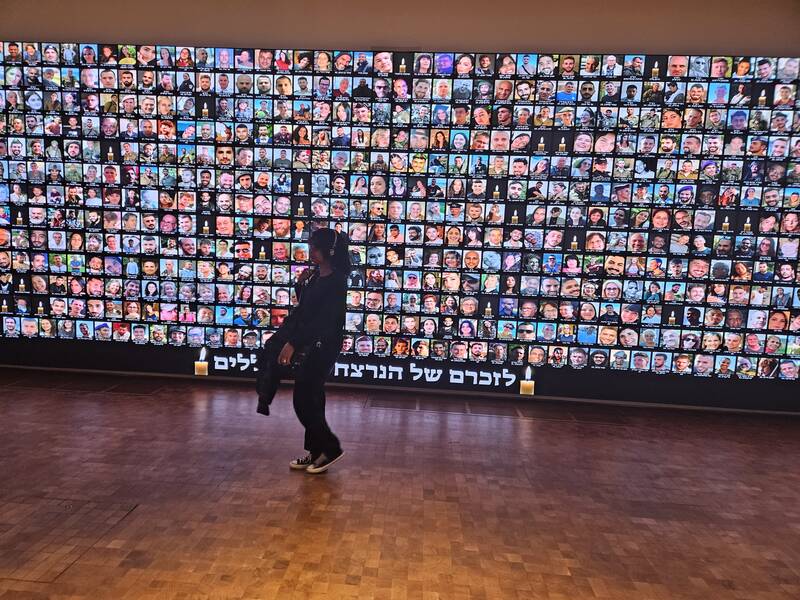
A trio of volunteers with Mercaz Olami spoke about their respective roles in the organization. Gadi, a lawyer and PhD, who investigates war crimes spoke about his shifting perspectives - as a civilian, a lawyer and a reservist- since October 7. He echoed the sense of loneliness expressed by others, as well as his profound gratitude for our visit.
He shared that one of his roles when called up was to identify belongings of soldiers (mostly Tazpitaniyot- the women who were watching the security cameras. As you are likely aware, their unit was overtaken and all the soldiers killed).
Among other things, Gadi made clear his sense that Jews in Israel and the Diaspora need each other now more than ever.
Our final stop was the National Library - a breathtaking, state-of-the art, environmentally friendly facility. Built, naturally, of Jerusalem stone in a design evoking the Western Wall it was truly magnificent.
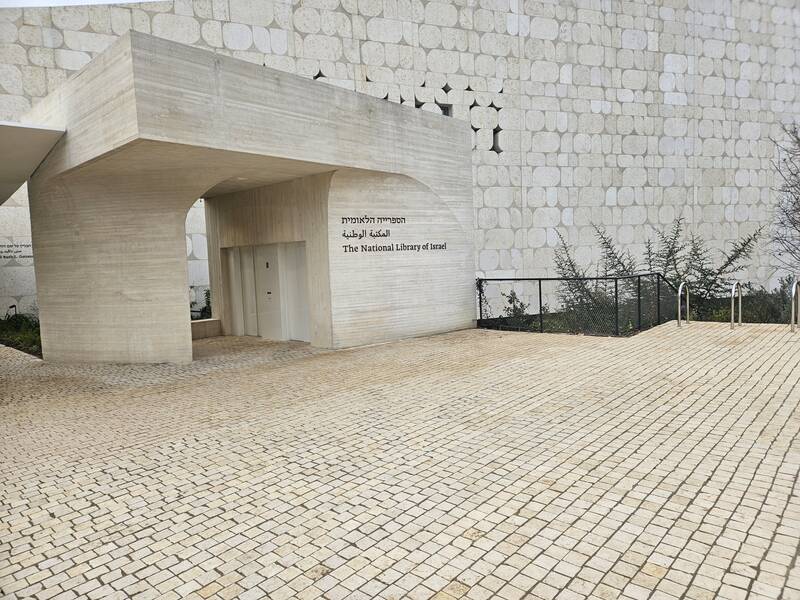
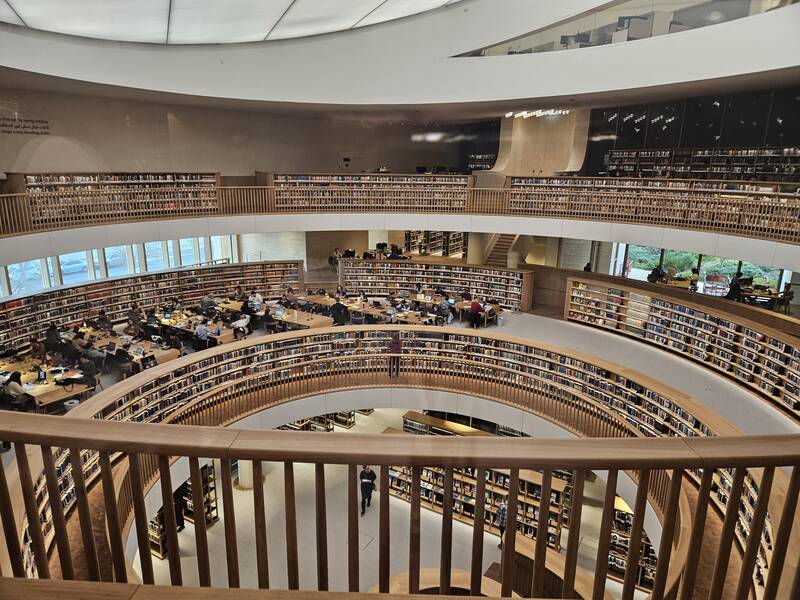
Housing over 4 million books, newspapers and an extensive collection of rare artifacts, an hour wasn't nearly enough time to explore.
It is a must-see for your future trips.
We packed up and checked out of the hotel, heading out for our final dinner as a group. Last stop...the airport.
In closing- for now- I can only paraphrase what I said from the bimah on Kol Nidrei: my home may be in the west, but my heart is in Israel.
P.S. I will follow up with some additional photos and reflections soon.
Day 6 Shabbat
17/02/2024 03:45:42 PM
Despite being Shabbat, it was hardly a day of rest. We headed to the Fuchsberg Center for shacharit services. Interestingly, part of the rabbi's interpretation of today's parsha, Terumah, related to bearing witness and creating intimacy (in the Temple).
It occurs to me that those concepts dovetail perfectly with many of the themes of this trip.
As we begin to process what we've seen and heard this week, it is clear, from listening to my colleagues that the intimate conversations we had with soldiers, survivors and family members were incredibly poignant and meaningful.
We returned to the hotel for a sumptuous ( think of the most deluxe and most crowded kiddush you've ever seen) lunch. We were joined by Rabbi Loren Sykes, who helped frame some of our raw emotions and reactions to our experiences this week. He spoke about some of the parallels being used in talking about October 7 (including holocaust and pogrom) and shared his views about why they don't apply.
After a short rest, we reconvened for a walking tour of the area near the hotel with our guide.
On our return, we were joined by Yitzhak Sokoloff, the founder and principal of Keshet Tours. He was called up for reserve duty- at the age of 69- recently. He spoke about some of the political repercussions of the war and the challenges of the double-standards others apply to Israel. We talked about the deeply polarized Israel before October 7, and how unified it has become since then. Of course, it begs the question: where do we go from here?
In closing, he spoke of the loneliness being experienced by Israel and the consequences of waning support on the world stage. He shared his sense that's why everyone has been so grateful for our visit. Israelis are feeling isolated and alone, on top of everything else they're dealing with.
Another resounding theme of the week is that there are so many more questions than answers.
Shavua tov and more to come tomorrow.
Day 5
16/02/2024 09:24:32 AM
After a classic (sumptuous) Israeli hotel breakfast, we headed to the Old City on foot. Shacharit services were held at the Egalitarian section of the Kotel.
I had never been to this section before. Conceptually, I'm glad it's there and available but have to admit that it didn't feel like an authentic Kotel experience for me.
I was saddened to see how few people were at the Kotel plaza. In the past, you had to jostle to get close. Heavy sigh...
Our amazing guide, Kayla, gave us an in-depth history of the temples and explained about ongoing excavations around the southern wall. The breadth of her knowledge is truly impressive.
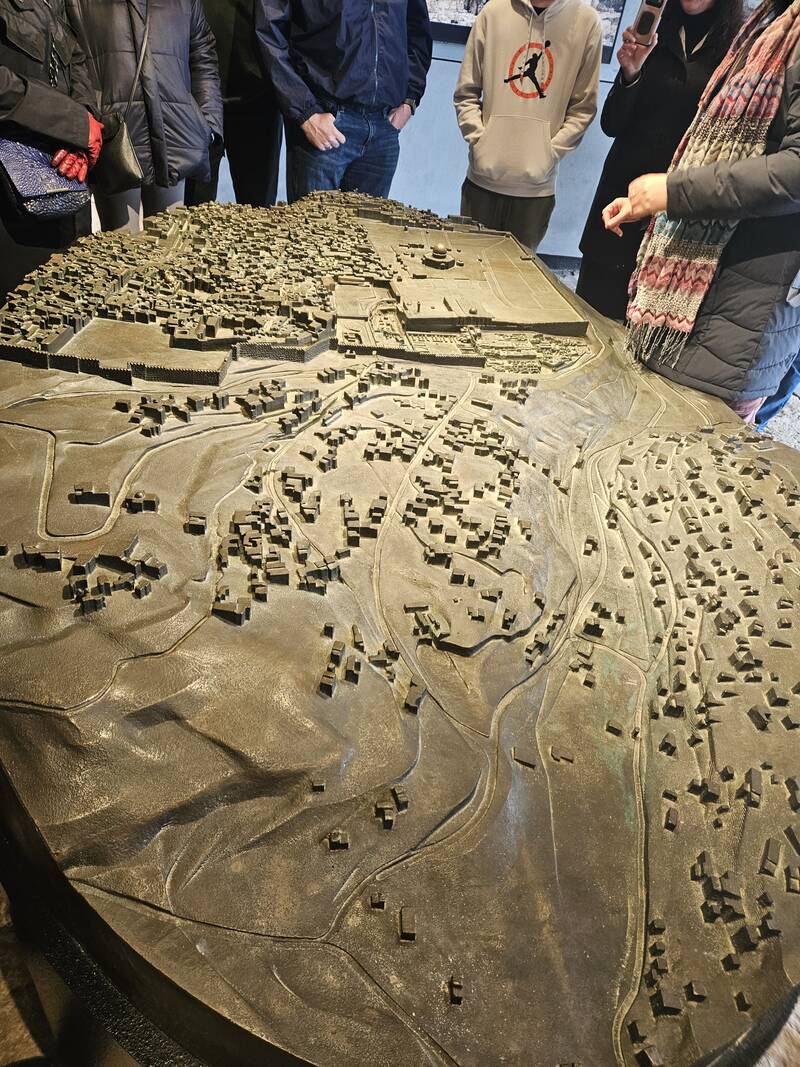
We then headed to the Cardo where the shopping bug hit several of our group members. After that, we broke into smaller groups to explore. We walked and walked and walked.
The Machane Yehuda market was as dynamic as I remember and best of all, the first place this trip where it wasn't obvious there was a war going on. It was full of people, food and a most welcome pre-Shabbat energy.
15,000 + steps later, it's back to the hotel to prepare for Shabbat.
We will be having Kabbalat Shabbat and dinner together as a group and then tomorrow a couple of walking tours and lectures. I will update late Saturday or Sunday.
Shabbat shalom...from Jerusalem.
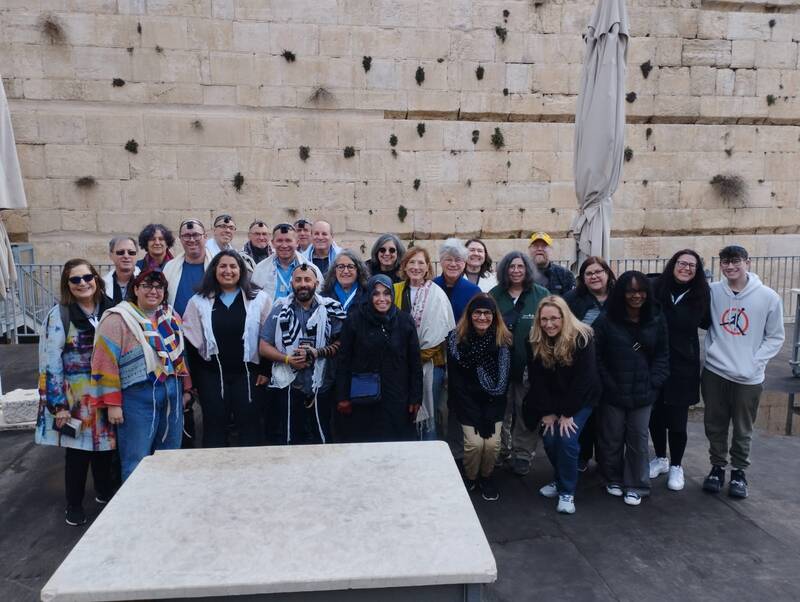
Day 4
15/02/2024 02:25:47 PM
We loaded our luggage on to the bus in preparation to leave Tel Aviv later in the day.
We visited Ichilov hospital's rehabilitation unit. Lior, a volunteer, met us outside and cautioned us about taking photos and videos without specific permission.
We sat in a common area and one by one, soldiers sat with us and shared their stories. We were supposed to be there for an hour but soldiers kept wanting to talk with us so we stayed much longer.
Each story was unique - some had more than one. All the young men were good-natured, funny and firm in their convictions. They all made clear how anxious they were to get back to their unit and "finish the job".
We extended our profound gratitude to each of them, including leaving them with some gifts. In turn, they were so grateful to us for coming to listen to them.
After a quick stop for lunch at the Sarona Market, we headed to the cemetery at Mount Hertzl. We visited the newest section which, sadly, is filling up quickly. Most of the soldiers buried there were under 25 years old. Heartbreaking.
Later in the afternoon, we went to Pantry Packers. This operation has been running for more than 10 years; run by Colel Chabad.
Post the 10/7 war they have expanded operations to help more families. Their packages are geared specifically to the recipients e.g. Ashkenazi/Sephardi/Ethiopian. Groceries or prepared meals also available. They also operate day cares, event venues and other initiatives for those affected by war and terror.
This operation was significantly more professional than the one we'd visited earlier in the week.
We were quickly able to set up a system to pack, label and fill close to 400 bags of lentils.
Apparently, I'm good at assembly line work. Who knew?
After dinner we went to the Tower of David Light show. Barely half the seats were filled and they now run only one show per evening - there used to be several. The lack of tourists is impacting everything here, too.
More to come tomorrow...
Day 3 - 95% heaven, 5% hell
14/02/2024 02:34:00 PM
We started our day with a presentation at our hotel by Barak, a long-time resident of Netiv Ha'asara. Barak, his wife Aya and 4 sons have been evacuated from their home and living in 2 hotel rooms in Tel Aviv since shortly after the attacks.
Barak gave us a history of life in the region, the various conflicts and the measures (complex, expensive and seemingly never-ending) taken over the years to secure Netiv Ha'asara.
In his words: " I was naive enough to believe in peace".
He made very clear that he and the other residents did everything in their power to ensure the safety of everyone in the moshav. While they would like to return to their home, they are waiting on the government : the outcome of the war and , of course, plans for the future of Gaza.
He shared, in explicit detail, what happened in his community - to his friends, family and neighbours - on October 7.
Acknowledging that many couldn't understand why they would choose to live there, he explained that life on the moshav was 95% heaven and 5% hell.
A masterful speaker, Barak's warmth, humour and deep pain left me shaken and wondering if I would be willing to live with those numbers.
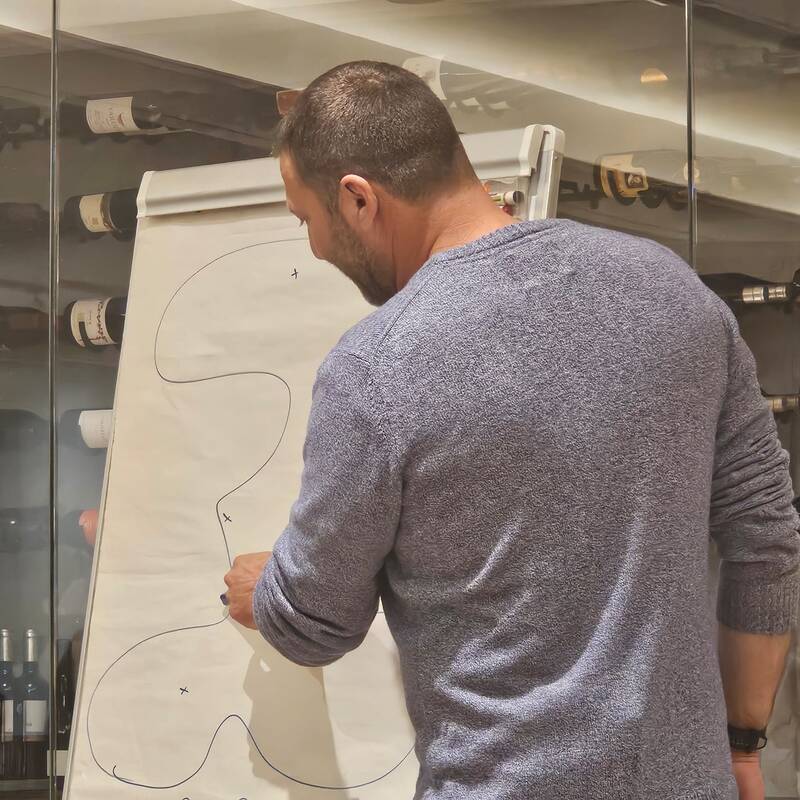
Our first stop of the day was Moshav Shokeda, a religious moshav in the "Gaza envelope". Today's task was harvesting beetroot leaves. I wondered whether or not it was a make-work project until one of the leaders of the moshav spoke and thanked us for helping them. They used to have 80 labourers and now have 8 and cannot keep up with all the work that needs to be done.
Rockets (from our side) were being fired the entire time we were working.
I couldn't help but wonder: how do people live like this?
I understood why- just as Barak said earlier: it's their home.
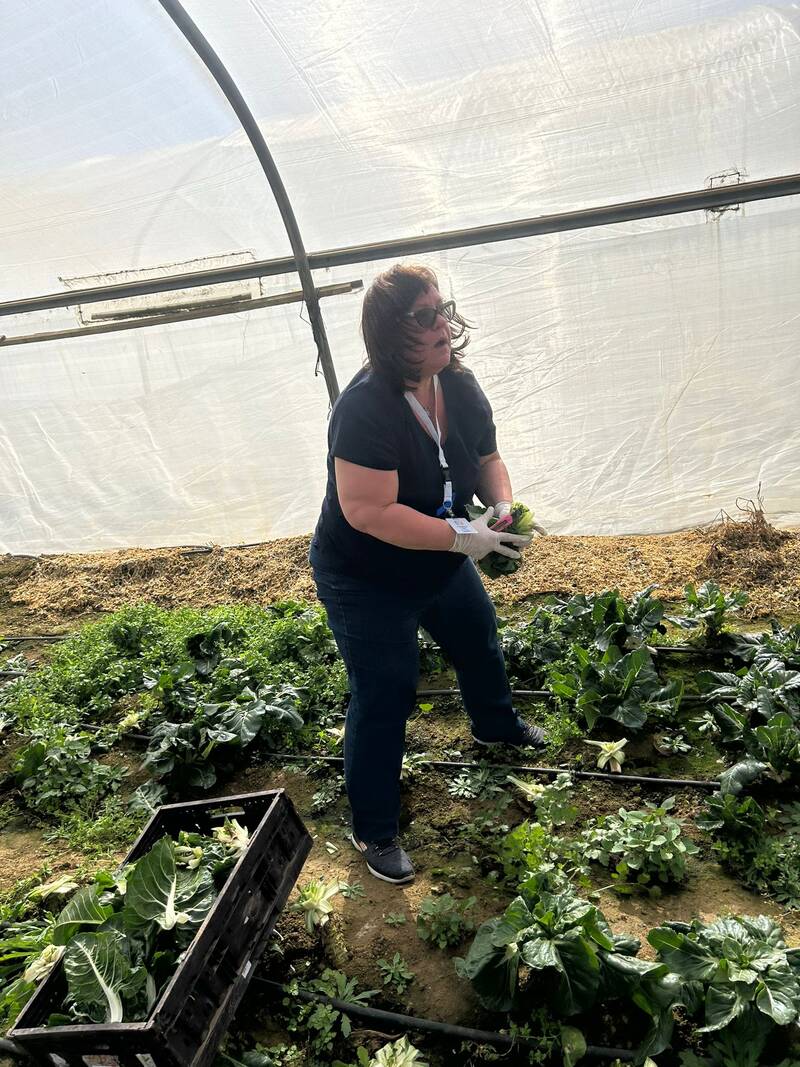
After our adventure in agriculture we visited Kibbutz Be'eri, site of the music festival where part of the massacre took place on October 7. We held a mincha service and said kaddish.
Similar to 'hostages square', there were many groups visiting, singing, praying and simply trying to process the savagery that took place on that now-hallowed ground. Makeshift memorials for those murdered there were all over. Trees have now been planted in a grove near the edge of the property in their memory.
And, of course, there were photos, posters and messages about the 134 hostages still in captivity.
Nearby Kfar Aza was our next stop. We were greeted by "daughter of the kibbutz", Chen. She spoke of the close-knit community, where most of her family and many friends who are like family lived together for years, less than a kilometer from the Gaza border.
Despite having laryngitis, she chose to meet with us and share her story. 63 members of her community were killed, 19 were taken hostage, 5 still remain in captivity.
Chen led us through the kibbutz, explaining the horrific events of October 7, as pieced together from first-hand accounts and text messages.
Like Barak this morning Chen was articulate, passionate and heartbroken about the trauma shared by her community. She quietly pleaded with us to share what we'd heard with our own communities and to fight, with whatever resources we could muster to ensure the remaining hostages were released.
Her last word to us was simple, powerful and laden with meaning: shalom.
I was pretty much emotionally wrung out after that and would have gladly called it a day. Alas, there were, as the saying goes, miles to go before I could sleep.
Through our guide for the trip, we arranged for a food truck to visit a reservists' base and we joined the soldiers for a barbecue dinner.
There were many rousing rounds of "Am Yisrael Chai" along with lots of getting-to-know-you chatter and laughs despite the broken Hebrew and broken English.
The soldiers were grateful to us for the dinner and for our support. I was able to deliver the hats our Chesed Knitters made and the letters our Hebrew School students wrote to them.
One quiet soldier, Eitan, had a question for us: "why doesn't the world believe us when we tell them what we've seen"?
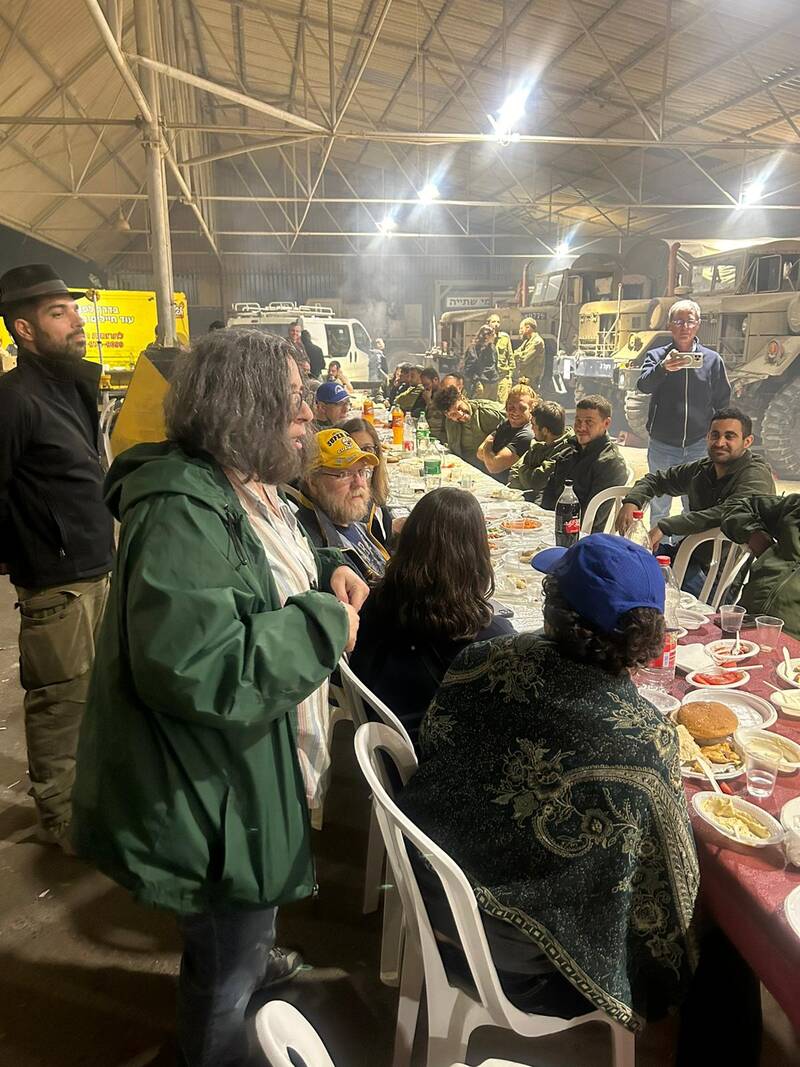
Day Two
13/02/2024 03:43:15 PM
Our morning session was with Rakefet Ginsberg, CEO of Masorti Israel. In her role for just about 3 years, Rakefet shared her sense that she was constantly moving from crisis to crisis and that certainly resonated with me.
She spoke about the role of Masorti in Israel: the work they're doing and all that has yet to be done.
For many years, the perception in Israel has been that the choices in Judaism were limited to Orthodox or secular. Masorti is changing that, community by community, all over Israel.
Our first stop was Leket, in Rishon L'Tzion, an organization that started 20 years ago as a food rescue. Today, they are providing fresh produce to a variety of social service agencies who , in turn, distribute food to displaced individuals and families, soldiers and many others.
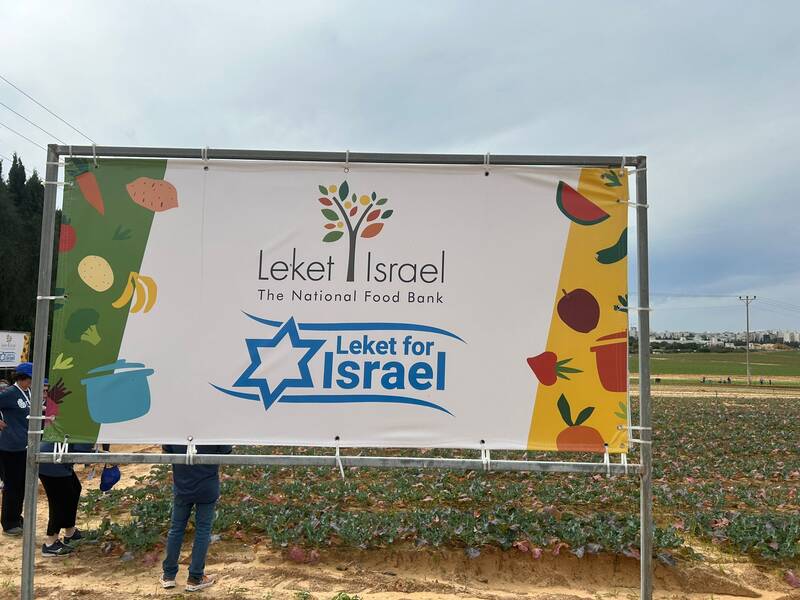
After October 7, Israeli's agriculture labour force was decimated when 40,000 Thai nationals, who worked on farms, left the country. In addition, Palestinian farm labourers who used to cross into Israel on a daily basis are no longer doing so.
Together with two groups of young women, one from Mexico City and one from the UK, we picked 2 tons of kohlrabi.
After a quick lunch at a nearby mall, we went to the the Jaffa Institute. Our "guide" was Zina Wernick, daughter of Beth Tzedec's Senior Rabbi Steve Wernick. She explained the Institute's mandate, offering food boxes for Holocaust survivors, families dealing with food scarcity and others who may be in need. As you can imagine, the demand has increased dramatically since the war started. Additionally, the Institute runs after school programs and a variety of other initiatives.
We packed a pallet of boxes with a variety of dried and canned foods, very similar to the NCJW Passover Food Drive that we housed last year (and, I'm pleased to say, will be doing again this year). While we had a good time, it was, surprisingly, not a very efficient operation.
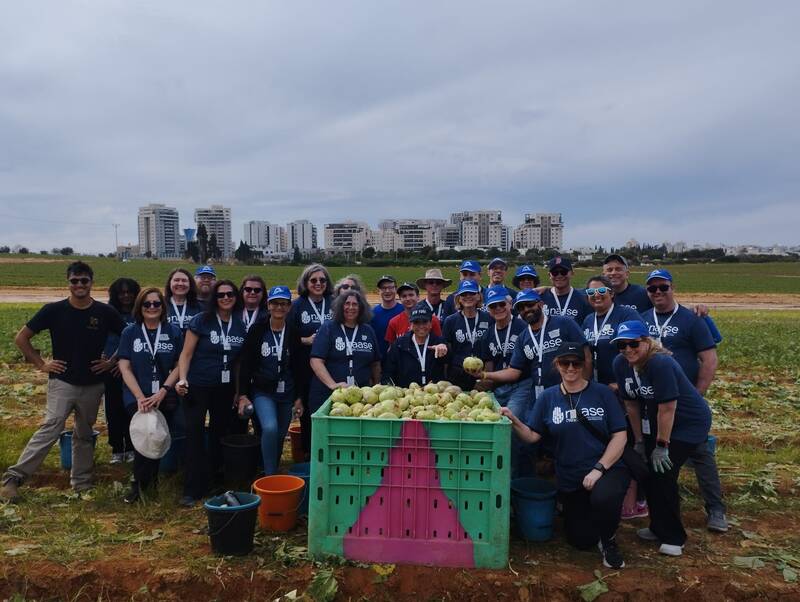
Towards the end of the day we headed to Hostages Square. We had the opportunity to meet privately with Yair Moses. Yair's parents, Kibbutz Nir Oz residents, were both kidnapped on October 7. His mother was one of the two elderly women released in late October. His 79-year-old father, Gadi, is still being held by Hamas.
Yair shared about how this trauma has affected his family. Interestingly, he noted that her time in captivity strengthened his mother and that the responsibility she felt taking care of others gave her a strong sense of purpose during those dark days.
Yair has not worked since 10/7 and spends most of his time bringing awareness to the plight of the remaining hostages. To that end, he gives interviews and does speaking engagements frequently.
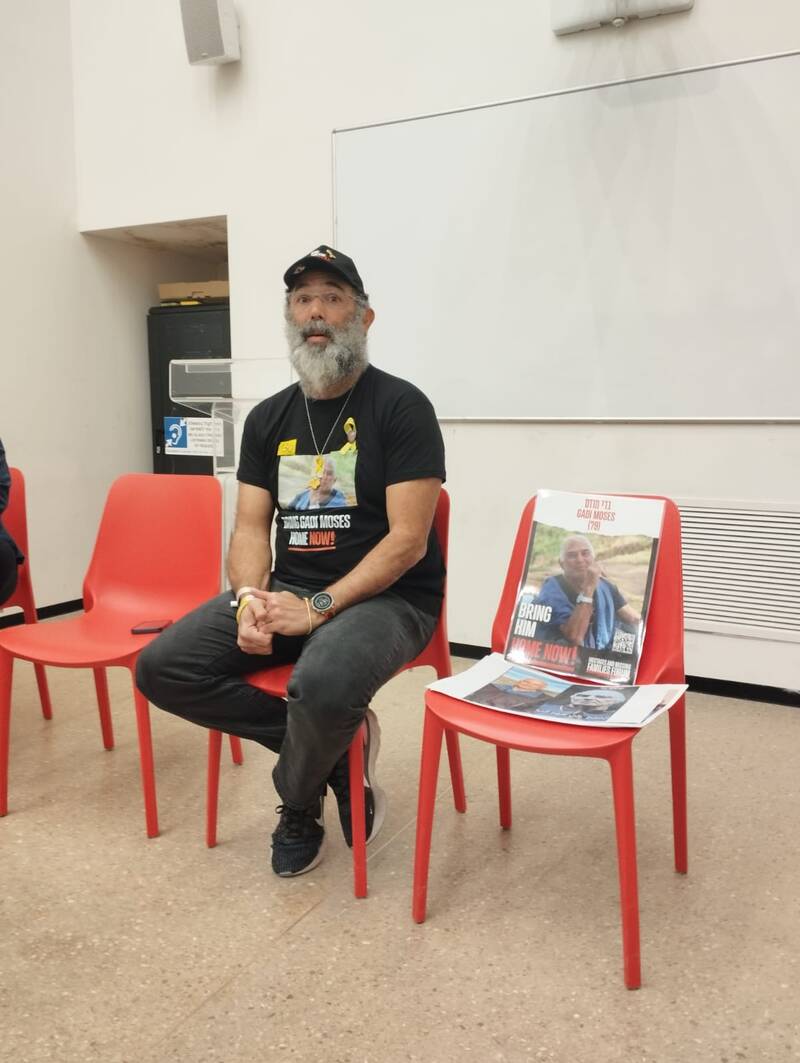
We participated in a prayer circle in the Square but could barely hear each other as there were several other events and gatherings happening at the same time.
As the sun set, hundreds of teens gathered for a large rally. On one hand, it was wonderful to see so many young Israelis galvanized by this cause but I found the atmosphere almost festive and I must admit I was unsettled by that.
More to come tomorrow...
Day One
12/02/2024 03:14:26 PM
Arrived at Ben Gurion Airport and connected with some of the group. Everyone was elated to learn that two hostages had been rescued overnight. I texted my husband and kids to say I'd arrived safely. My youngest wrote back: "oh good...you're home".
The airport was uncharacteristically quiet- tourism is way down- but traffic on the way to the hotel was heavy...some things haven't changed.
After a short rest, we met in the hotel for a wonderful dinner. After that, we had a brief session led by Rabbi Mauricio Balto (Executive Director of Mercaz Olami and Masorti Olami) and Dr Yitzar Hess (Vice Chairman of WZO).
In their remarks, both made clear that the Israel we were visiting now was far different than the one we'd seen before. They talked about the new threat of anti-Semitism from within Israel and referred to life in Israel now as a long shiva.
The light mood we'd been enjoying became heavy and dark. While we'd all heard and read much about the existential crisis Israel finds itself in post 10/7, hearing it from those who experienced it, in Israel, packed an emotional wallop.
More to come tomorrow.




